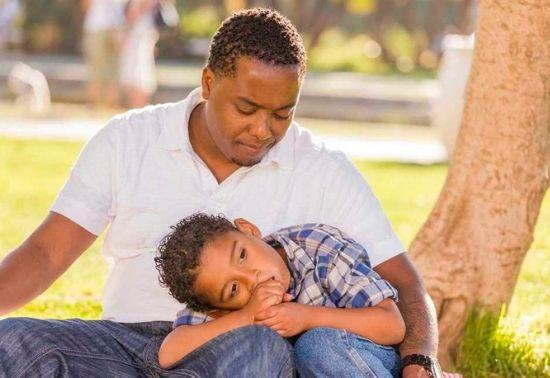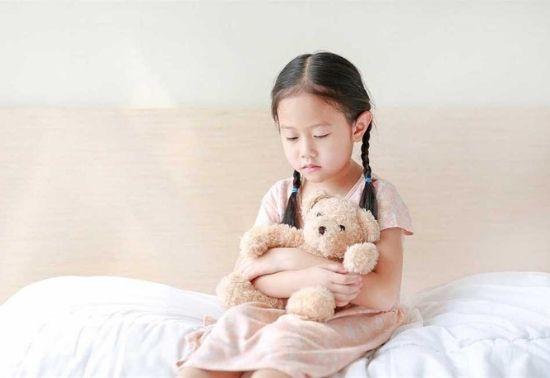Do children get depressed?
In short, the answer is yes.
Approximately 10 to 20 percent of very young Canadian children have a mental health problem. We know that 70 percent of mental health problems have their onset during childhood or adolescence. We also know that mental and physical health are linked. So, if a child has a physical health problem, it is possible to develop mental health issue and vice versa.
Mental illness is a leading cause of disability in Canada. Depression increases an individual’s risk of suicide, which is the second leading cause of death in young people (Dwyer et al., 2020).
50 to 70 percent of children who experience depression are at risk of a recurring depression within 5 years (Dunn et al., 2006) which can result in worsening suicidality.
Depression in children is real and needs our attention.
How do I know if my child is depressed?

Caregivers can look for signs of depression in children. Common symptoms include the following:
- Poor sleep
Difficulty falling asleep or staying asleep resulting in sleep loss is a major predictor of depression in young Canadians (Hoyniak et al., 2020). Children with depression may also be excessively sleepy and complain of feeling tired all the time.
- Loss of interest or pleasure in activities
When children suddenly stop finding joy in games or play activities that were previously enjoyed, this is a red flag, especially if it isn’t related to normal developmental maturation. For example, it is normal for children to develop varying interests over time and play with new toys, leaving old ones behind. It isn’t normal for healthy children to have no interest in any activities or play.
- Physical (somatic) complaints
As mentioned, physical and mental health are linked. Children with depression may experience physical symptoms such as persistent headaches, vomiting or complaints of a sore stomach. A visit to a doctor can determine if the physical complaints have a medical cause or if further mental health assessment is recommended. Recent research has also discovered that a genetic link exists in children with asthma and major depression (Lui et al., 2020) meaning that if a child has asthma, it is helpful to monitor that child for depression as well since the two health issues may share the same genetic profile.
- Changes in Mood
When children become unusually irritable and angry or feel deeply saddened, hopeless or guilty for a prolonged period of time, it is important to explore possible factors that are contributing to this change in mood. If teachers and caregivers are noticing negative moods for more than 2 weeks, it is worth further investigation.
- Difficulty concentrating or making decisions
Children with depression typically struggle with completing tasks either at home or at school due to the impact that depression has on thinking and memory. If a child is suddenly receiving poorer grades in school or is consistently forgetting to do normal everyday tasks, it is cause for concern.
- Withdrawing from family and friends
Some healthy children are naturally shy or hesitant to interact with others and may eventually ‘come out of their shell.’ In 2020, Statistics Canada reported that 25 percent of children (aged 5 to 17) with poor mental health are more likely to have difficulty making friends. If a child begins refusing to spend time with family or friends and prefers to be alone, it may be a sign of deteriorating mental health.
- Changes to appetite
If a child suddenly experiences an increase or decrease in appetite not related to a growth spurt, it is worth monitoring. Children can seek food for comfort or can refuse to eat when dealing with a mental health problem. Sudden weight gain or weight loss may be a red flag and should be investigated further to determine the cause.
- Showing signs of anxiety
Anxiety and depression are common co-existing mental health problems. When a child becomes more clingy or anxious with caregivers or seems to have separation anxiety during normal everyday activities (for example, drop-offs at daycare or school or crying at bedtime), it may be an early warning sign of a mental health issue.
- Thoughts of death or suicide
Statements made by children such as “I wish I wasn’t alive” or “I don’t want to be in this world” or “I’m going to kill myself” are serious and require immediate attention from caregivers. If a child is focusing on themes of death (either in what the child talks about or expresses through drawings), the caregiver(s) should immediately contact the pediatrician or family doctor for further evaluation.
What causes depression in children?

Depression is a result of a combination of many factors including genetics, life events, environmental influences, physical/mental health and family history.
1) Genetics
Depression is a highly heritable disorder. This means that if a child has a parent with depression, the child has a higher chance of developing depression than a child whose parent has never had depression.
2) Adverse Life Events
Children who have been victims of bullying, maltreatment, deprivation or trauma are at higher risk of developing depression in their lifetime (Elmore et al., 2020).
3) Environmental Influences and Family History
Children brought up in homes wherein the parenting style is harsh, including highly controlling/low warmth may contribute to the development of depression. Research shows a moderate association between an insecure attachment (to a parent/caregiver) and depression in children and adolescents (Spruit et al., 2019). Where there is a family history of violence, alcohol abuse or physical/sexual abuse or immigration the risk of depression increases for the child.
4) Physical and other mental health concerns
Children with various physical health problems or pre-existing mental health conditions such as Attention-Deficit/-Hyperactivity Disorder (ADHD), Conduct Disorder and Obsessive-Compulsive Disorder (OCD) are at higher risk of developing depression.
Are there any protective factors that may reduce the risk of depression in children?

Having a secure attachment to a caregiver, positive childhood experiences, learning how to become resilient in the face of challenges or adversity, participating in physical activity and sports (Matta et al., 2021), maintaining healthy sleep routines and meaningful connections to peers are factors that can protect a child from the onset of depression.
What do I do if I suspect my child is depressed and how is it diagnosed?
If you suspect your child is depressed, take him/her to a pediatrician or primary care physician to have a full medical assessment, to rule out any physical health problems. Caregivers may be asked to fill out questionnaires that review symptoms seen in the child. Children may also have other issues such as anxiety, ADHD or eating disorders that can be related to depression. The physician can then decide if a referral is needed for further assessment by a mental health professional.
What is the treatment for depression in children and is it even necessary?

Research shows that the best treatment for depression includes a combination of medication and cognitive behavioural therapy and these may be associated with lower rates of relapse (Viswanathan et al., 2020). The type of treatment your child may receive for depression may include a combination of therapies and medication depending on the child’s age, communication skills and intellectual abilities.
Individual treatment may include play therapy (for younger children), resilience-oriented cognitive behavioural therapy (talk therapy for older children) and learning strategies to recognize and cope with big emotions.
Family therapy may also be beneficial in coaching parents to learn healthy responses to a child’s emotions (Luby et al., 2020), improve family communication, and learn strategies for self-regulation.
After careful assessment and discussion with your child’s doctor and/or mental health team, your child may be prescribed medications to treat the depression. Many parents are fearful of giving their children medications and this is a decision that is best made in collaboration with mental health professionals. Parents and caregivers can learn about the risks and benefits of specific medications by talking to the doctors or professionals and asking questions. It may take a few weeks to notice a difference in the child’s emotions after starting an antidepressant and this is to be expected. Sometimes it takes a trial of a few different medications to find the right one for your child. Caregivers need to be able to monitor the child to observe how the child is tolerating any medication and to provide feedback to the doctor on a regular basis. This can help the doctor in determining the right dose of medication for the child. It is very important that the child take the medication at the same time every day. Sometimes this means that schools become involved in supporting the child if a medication is needed during the school day. Caregivers need to be aware of the dangers of stopping a medication abruptly and any changes to medications should be in consultation with the child’s doctor.
When mental health issues are left untreated, the risk of long-term disability increases. Results from the new Canadian Health Survey on Children and Youth (CHSCY) indicate that 4% of children and youth aged 1 to 17, as reported by their parents, had fair or poor mental health in 2019, one year prior to the pandemic. The survey also found that poor mental health among children and youth was associated with adverse health and social outcomes, such as lower grades and difficulty making friends. (Statistics Canada, 2020).
It is essential that any child who has suffered a depression be monitored regularly over time, especially during adolescence and when transitioning into adulthood. Monitoring the individual over his/her youth and adolescence is a proactive way to treat symptoms early which can prevent further illness or disability (Asarnow et al., 2019).
How can KIDTHINK help?
KIDTHINK is a multi-disciplinary child mental health centre in Winnipeg, Manitoba who supports the mental health of children under the age of 12 years and their families. We offer mental health assessments to diagnose depression in children and provide a wide range of therapies to treat depression.
Caregivers are invited to contact KIDTHINK’s Information Line at (431) 388-5373 to speak with an Intake Coordinator and to schedule an assessment with a mental health professional. For more information, please visit our webpage at www.kidthink.ca
Written by Tamara Rogers, MSc., BMR (OT), OT Reg. (MB)
Outreach Clinician
MORE COMMON THAN YOU THINK

- 1 in 7 children suffers from mental illness in Manitoba (Chartier et al., 2016).
- 70% of mental health problems have their onset in childhood or adolescence (Government of Canada, 2006).
There Is Hope The good news is that mental illness can be treated effectively. There are things that can be done to prevent mental illness and its impact and help improve the lives of children experiencing mental health concerns. Early intervention is best.
How KIDTHINK Can Help
To make a referral contact us
To subscribe to our newsletter click help
RESOURCES
Read about the Mental Health Commission of Canada’s Supporting Early Childhood Mental Health by clicking on this link: https://www.mentalhealthcommission.ca/sites/default/files/2020-07/early_childhood_one_pager_eng.pdf
Read about the Mental Health Commission of Canada’s Early Childhood Mental Health: ‘What We Heard’ Report Summary by clicking on this link: https://www.mentalhealthcommission.ca/sites/default/files/2020-11/ECMH_What_We_Heard_Report_eng_0.pdf
Download this app to help cope with the stresses of life: http://calminthestormapp.com/
REFERENCES
Asarnow, J., Tompson, M., Klomhaus, A., Babeva, K., Langer, D. and Sugar, C. (2019). Randomized control trial of family-focused treatment for child depression compared to individual psychotherapy: one-year outcomes. The Journal of Child Psychology and Psychiatry, 61(6):662-671. https://doi.org/10.1111/jcpp.13162
Dunn, V., Goodyer, IA. (2006). Longitudinal investigation into childhood and adolescent-onset depression. British Journal of Psychiatry, 188:216-222.
Dwyer, J., Stringaris, A., Brent, D. and Bloch, M. (2020). Annual research review: defining and treating pediatric treatment resistant depression. The Journal of Child Psychology and Psychiatry, 61(3): 312-332. https://doi.org/10.1111/jcpp.13202
Government of Canada (2006). The human face of mental health and mental illness in Canada. Ottawa: Minister of Public Works and Government Services Canada.
Elmore, A., Crouch, E. and Chowdhury, M. (2020). The interaction of adverse childhood experiences and resiliency on the outcome of depression among children and youth, 8-17 year olds. Child Abuse & Neglect, Volume 107, 104616, ISSN 0145-2134. https://doi.org/10.1016/j.chiabu.2020.104616
Hoyniak, C.P., Whalen, D.J., Barch, D. et al. Sleep problems in preschool-onset major depressive disorder: the effect of treatment with parent–child interaction therapy-emotion development. Eur Child Adolesc Psychiatry (2020). https://doi.org/10.1007/s00787-020-01641-1
Luby, J., Gilbert, K., Whalen, D., Tillman, R., and Barch, D. (2020). The differential contribution of the components of parent-child interaction therapy emotion development for treatment of preschool depression. Journal of the American Academy of Child & Adolescent Psychiatry, 59(7):868-879.ISSN 0890-8567.https://doi.org/10.1016/j.jaac.2019.07.937
Lui, X., Munk-Olsen, T., Albiñana, C., Vilhjálmsson, B., Pedersen, E., Schlünssen, V., Bækvad-Hansen, M., Bybjerg-Grauholm, J., Nordentoft, M., Børglum, A., Werge, T., Hougaard, D.,Mortensen, P. and Agerbo, E. (2020). Genetic liability to major depression and risk of childhood asthma. Brain, Behavior, and Immunity, 89:433-439. ISSN 0889-1591. https://doi.org/10.1016/j.bbi.2020.07.030
Matta, P., Baul, T., Loubeau, K., Sikov, J., Plasencia, N., Sun, Y. and Spencer, A. (2021). Low sports participation is associated with withdrawn and depressed symptoms in urban, school-age children. Journal of Affective Disorders, 280(B):24-29. ISSN 0165-0327. https://doi.org/10.1016/j.jad.2020.11.076
Spruit, A., Goos, L., Weenink, N. et al. (2020) The Relation Between Attachment and Depression in Children and Adolescents: A Multilevel Meta-Analysis. Clin Child Fam Psychol Rev 23, 54–69. https://doi.org/10.1007/s10567-019-00299-9
Statistics Canada: Canadian Health Survey on Children and Youth, 2019 Released at 8:30 a.m. Eastern time in The Daily, Thursday, July 23, 2020 https://www150.statcan.gc.ca/n1/daily-quotidien/200723/dq200723a-eng.htm
Viswanathan M, Kennedy SM, McKeeman J, et al. (2020). Treatment of Depression in Children and Adolescents: A Systematic Review [Internet]. Rockville (MD): Agency for Healthcare Research and Quality (US). (Comparative Effectiveness Review, No. 224.) https://www.ncbi.nlm.nih.gov/books/NBK555853/
Waddell et al. (2005). A public health strategy to improve the mental health of Canadian children. Canadian Journal of Psychiatry, 50:226-233.




